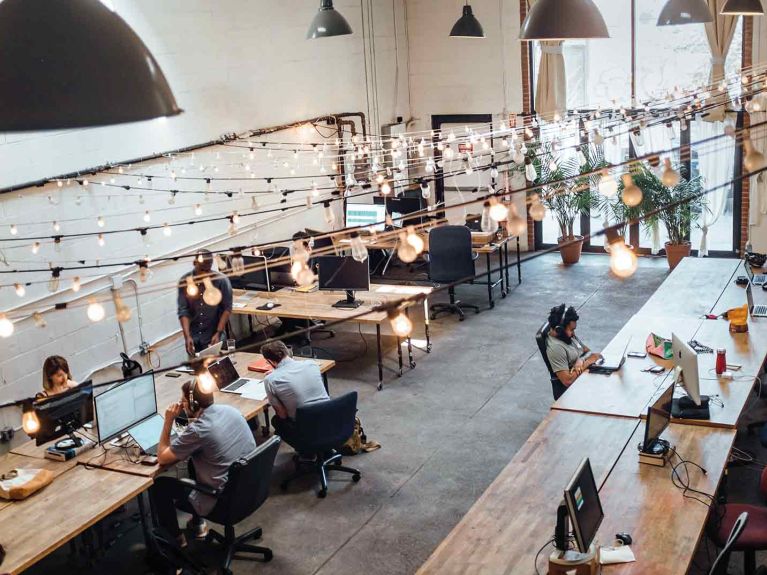Funding to help great new ideas thrive
Entrepreneurs with ideas for new businesses enjoy great prospects for successful startups in Germany. The welcome is especially warm for sustainable innovations.

“We’re building a digital twin for our earth,” says Dr Gino Caspari. Based in Bern and trained as an archaeologist, Gino Caspari is a co-founder of GeoInsight, a startup which aims to set new standards in assessing risks from natural disasters and the affect of climate change. GeoInsight started work in spring 2022 as a spin-off from Ruhr University Bochum. The international team of entrepreneurs works 100% remotely from locations in Germany, Portugal and Switzerland. They use AI to generate new learnings from the growing flood of geographical data which ranges from satellite imagery to photos on social media.
“At the heart of this innovation is the development of a data structure which can be combined and integrated with geographical data of all different kinds,” Caspari explains. “Machine learning makes it possible to identify structures and patterns which would be very hard to spot using traditional geo-information systems.” Even users without high levels of specialist knowledge can evaluate large quantities of data. Right now the team is in talks with the European Space Agency with a view to the ESA providing its satellite imagery directly via their platform. “That would massively increase the usefulness and value of the data,” Caspari adds.
Their model is just as interesting to international companies which are monitoring epidemics, climate change or food security, as it is to the finance and insurance industry, government agencies and governments. “For instance it can help reinsurers to estimate potential losses due to a disaster, regardless of whether it’s a fire, flood or an earthquake,” explains one of the project’s co-founders, Dr Michael Jendryke. After spending several years abroad, the geomatics expert now runs the business side of the startup from Germany. He met his co-founder Gino Caspari when they were researchers at Wuhan University and he has known the company’s other co-founder Dr Ana Gago da Silva from when they worked for the UN in Geneva. “I looked for team members who I have known for a long time, whom I trust and who have the knowledge and tenacity to see something like this through,” he explains. “That’s particularly important when you’re working remotely and don’t see each other every day.”

The term startup describes a young business no more than 12 years old. Innovative startup-founders invigorate the economy and are considered to be key to social progress. The German Startup Monitor listed 2000 startups in 2022 and around 4,800 founders in Germany, employing 34,539 staff. Just under half of the startups are working on AI which plays a major role in their business model. This was followed by Industry 4.0 and the Internet of Things. So-called “green startups” make up just under 30% of all innovative new businesses in Germany, and a third of these have close links to scientific research.
Many universities in Germany help early-career academics interested in setting up their own businesses with making their business ideas a reality. The WORLDFACTORY programme at Ruhr University Bochum is focusing on the international market. “These startup hubs play a vital role, particularly during the initial phase,” says Dr Ana Gago da Silva. The data scientist has lived in France and Switzerland but now works for GeoInsight from Portugal. “They create opportunities for networking, while promoting collaboration, building partnerships and providing robust infrastructure for startups,” she says. Right from when her team were applying for funding through EXIST research transfer, they were able to access professional support. “Submitting an application including a business case and pitch is a pretty big piece of work,” Jendryke recalls. Dealing with legal and regulatory issues proved to be a major challenge for the international team during the project. “In Germany we have a strong funding system to support startups which is very important to developing all levels of a business,” says João Carlos dos Santos Manuel, a software developer. “Without that support, I think most startup ideas would never get off the ground,” he adds.
Having an international background is a strong selling-point for the young company. A study by the Bertelsmann Stiftung found that international startup founders not only contribute language skills, but also valuable skills and experience which are important when it comes to successfully expanding an innovative business. The founders of GeoInsight share this view. “We all have experience of different cultural and linguistic spaces,” says Gino Caspari. “The moment we start dealing with international organisations we meet team leaders from India or research group leaders from China. Being able to know and evaluate what makes them tick can make the difference whether the door opens for us or not.”


